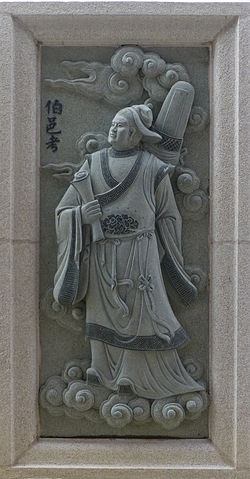This article possibly contains original research .(August 2025) |

| Bo Yikao | |||||||||
|---|---|---|---|---|---|---|---|---|---|
| Chinese | 伯邑考 | ||||||||
| |||||||||
Bo Yikao was the eldest son of King Wen of Zhou and the elder brother of King Wu who was the founder of the Zhou dynasty of ancient China.
Contents
As a member of the Zhou royal house,his family name was Ji (姬). 伯;Bó refers to his status as the oldest son of his father;邑;Yì may have been his personal name's element or a posthumous name used for ritual purposes;考;Kǎo either means "long-lived" [1] or is a posthumous epithet used to refer to a deceased father. [2]
It is known that he did not inherit his father's realm along the Wei River. Based on later Chinese inheritance laws and legends,it is typically thought that he predeceased his father,e.g. by Sima Qian. [3] Stories such as the Fengshen Yanyi lay the guilt upon King Zhou,the last king of the Shang dynasty,and the traditional account of his death was taken by later Chinese jurists as the first instance of lingchi (the "death by a thousand cuts"). [4] However,passages in the Book of Rites [5] [6] and the Masters of Huainan [7] assume that King Wu's inheritance simply represented an aberration or even an older tradition among the Zhou of passing over the eldest son. In traditional accounts not entirely dismissed by modern scholarship, [8] : 203 Bo Yikao's granduncle Taibo of Wu had likewise been passed over in favor of a younger son. [9]